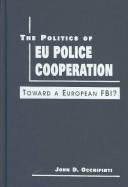| Listing 1 - 6 of 6 |
Sort by
|

ISBN: 1588261182 Year: 2003 Publisher: London Rienner
Abstract | Keywords | Export | Availability | Bookmark
 Loading...
Loading...Choose an application
- Reference Manager
- EndNote
- RefWorks (Direct export to RefWorks)
Public administration --- European Union --- Law enforcement --- -Security, International --- -Terrorism --- -Transnational crime --- -Police administration --- -351.74 EUROPOL --- 351.74 EUR --- Police --- Police management --- Management --- Multinational crime --- Transborder crime --- Crime --- Acts of terrorism --- Attacks, Terrorist --- Global terrorism --- International terrorism --- Political terrorism --- Terror attacks --- Terrorist acts --- Terrorist attacks --- World terrorism --- Direct action --- Insurgency --- Political crimes and offenses --- Subversive activities --- Political violence --- Terror --- Collective security --- International security --- International relations --- Disarmament --- International organization --- Peace --- Enforcement of law --- Criminal justice, Administration of --- International cooperation --- Prevention --- Administration --- Europol --- -European Police Office --- History --- Police administration --- Security, International --- Terrorism --- Transnational crime --- International cooperation. --- Prevention. --- Criminal justice, Administration ofInternational cooperation --- ManagementEuropol --- -European Police OfficeHistory --- -History --- 351.74 EUROPOL --- European Police Office --- History. --- Policing
Book
ISBN: 9781626374744 1626374740 Year: 2023 Publisher: Boulder
Abstract | Keywords | Export | Availability | Bookmark
 Loading...
Loading...Choose an application
- Reference Manager
- EndNote
- RefWorks (Direct export to RefWorks)
Will the European Union soon have a policing agency similar to the U.S. Federal Bureau of Investigation? John Occhipinti traces the evolution of the European Police Office (Europol), bringing to life the core themes—e.g., the tension between supranationalism and intergovernmentalism, concerns over the "democratic deficit" in the EU, and the impact of enlargement—in the study of European integration. Occhipinti draws from competing theories of European integration to explain the development of supranationalism in European police cooperation. Considering forces stemming from both within and outside of the EU and reflecting concerns over international terrorism and transnational organized crime, he explores the roles played by key actors and events at every stage of Europol's development, from the initial creation of the Trevi Group in 1975 to mid-2002. His work is a major contribution not only to the literature on Third Pillar issues, but also to an understanding of the deepening of European integration overall.
Book
ISBN: 9781138779556 1138779555 Year: 2015 Publisher: Abingdon: Routledge,
Abstract | Keywords | Export | Availability | Bookmark
 Loading...
Loading...Choose an application
- Reference Manager
- EndNote
- RefWorks (Direct export to RefWorks)
This book examines the role of agencies and agency-like bodies in the EU’s Area of Freedom, Security and Justice (AFSJ). When the Maastricht Treaty entered into force on 1 November 1993, the institutional landscape of the so-called ‘Third Pillar’ looked significantly different than it does now. Aside from Europol, which existed only on paper at that time, the European agencies examined in this book were mere ideas in the heads of federalist dreamers or were not even contemplated. Eventually, Europol slowly emerged from its embryonic European Drugs Unit and became operational in 1999. Around the same time, the European Union (EU) unveiled plans in its Tampere Programme for a more extensive legal and institutional infrastructure for internal security policies. Since then, as evidenced by the chapters presented in this book, numerous policy developments have taken place. Indeed, the agencies now operating in the EU’s Area of Freedom, Security and Justice (AFSJ) are remarkable in the burgeoning scope of their activities, as well as their gradually increasing autonomy vis-à-vis the EU member states and the institutions that brought them to life
Book
ISBN: 9781138812406 Year: 2015 Publisher: London : Routledge,
Abstract | Keywords | Export | Availability | Bookmark
 Loading...
Loading...Choose an application
- Reference Manager
- EndNote
- RefWorks (Direct export to RefWorks)
This book examines the evolution towards increased supranational governance in the EU’s Area of Freedom, Security and Justice (AFSJ). At the end of 2009, a successor programme to the Tampere and Hague Programmes was developed under the Swedish Presidency. Called the ‘Stockholm Programme’, it was adopted at a special EU Council Summit on 10-11 December 2009. The new agenda covers the period 2010-2014 and emphasises six areas of priority. In the context of these priorities, as well as the innovations introduced by the Lisbon Treaty, this edited book analyses policy change in the AFSJ, especially as it has been affected by the rise of supranational governance in this domain. From police cooperation and crime fighting to border management and counter-terrorism, much has changed, and the EU has taken yet another step forward in the direction of supranational governance. However, the various contributions also highlight that there are still problems and challenges remaining for the AFSJ. Collectively, this book considers how consequential the Lisbon Treaty has been for the AFSJ, as well as how successful the EU has been in achieving its stated goals as expressed in the Stockholm Programme. Thus, this book makes a significant contribution to the scholarly investigation of the AFSJ, but also to the study of European integration in general
Internal security --- Supranationalism --- National security --- Justice, Administration of --- European Union --- European Union countries --- Politics and government.
Book

ISBN: 168585088X Year: 2022 Publisher: Boulder : Lynne Rienner Publishers,
Abstract | Keywords | Export | Availability | Bookmark
 Loading...
Loading...Choose an application
- Reference Manager
- EndNote
- RefWorks (Direct export to RefWorks)
The authors explore how European Union policy has influenced—and been influenced by—each of the twenty-five member states.
Book

ISBN: 9781685850883 Year: 2022 Publisher: Boulder
Abstract | Keywords | Export | Availability | Bookmark
 Loading...
Loading...Choose an application
- Reference Manager
- EndNote
- RefWorks (Direct export to RefWorks)
| Listing 1 - 6 of 6 |
Sort by
|

 Search
Search Feedback
Feedback About UniCat
About UniCat  Help
Help News
News